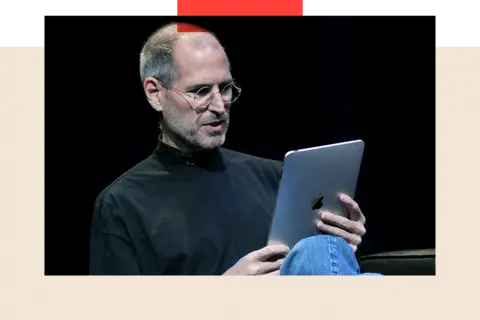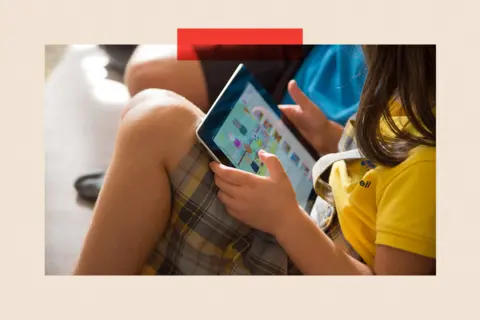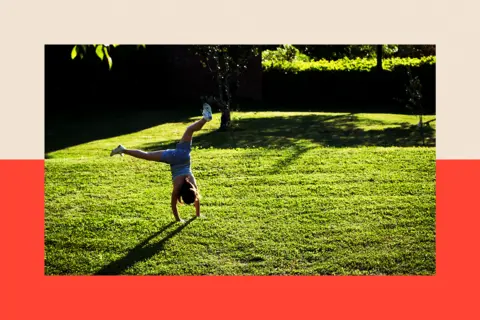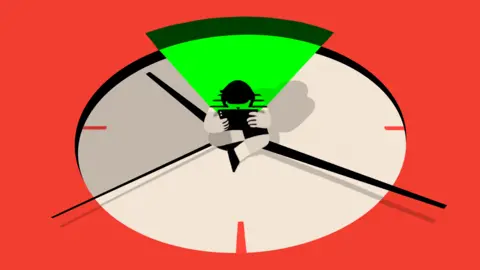What screen time really does to children’s brains


 BBC
BBCZoe will likely be responding to reader feedback about this text between 11am and 12pm (BST) as we speak. Go to the feedback part on the backside of the web page from 10am to share what you consider the influence of display screen time on kids
The opposite day, whereas I used to be doing a little family chores, I handed my youngest little one his dad’s iPad to maintain him entertained. However after some time I all of the sudden felt uneasy: I wasn’t protecting a detailed eye on how lengthy he had spent utilizing it or what he was . So I informed him it was time to cease.
A full-blown tantrum erupted. He kicked, he yelled, he clung to it and tried to push me away with the may of a livid under-five. Not my most interesting hour as a dad or mum, admittedly, and his excessive response bothered me.
My older kids are navigating social media, digital actuality and on-line gaming, and generally that issues me too. I hear them tease one another about needing to “contact grass” – disconnect from the tech and get outdoor.
The late Steve Jobs, who was CEO of Apple when the agency launched the iPad, famously did not let his personal kids have them. Invoice Gates has stated he restricted his kids’s entry to tech too.
 Justin Sullivan/Getty Photos
Justin Sullivan/Getty PhotosDisplay time has change into synonymous with unhealthy information, blamed for rises in despair in younger individuals, behavioural issues and sleep deprivation. The famend neuroscientist Baroness Susan Greenfield went so far as to say that web use and laptop video games can hurt the adolescent mind.
Again in 2013 she in contrast the adverse results of extended display screen time to the early days of local weather change: a major shift that folks weren’t taking critically.
Loads of persons are taking it extra critically now. However warnings concerning the darkish aspect won’t inform the total story.
An editorial within the British Medical Journal argued that Baroness Greenfield’s claims across the mind had been “not based mostly on a good scientific appraisal of the proof… and are deceptive to oldsters and the general public at giant”.
Now, one other group of UK scientists declare that concrete scientific proof on the downsides of screens is missing. So have we acquired it flawed in the case of worrying about our youngsters and curbing their entry to tablets and smartphones?
Is it actually as unhealthy because it appears?
Pete Etchells, a psychology professor at Bathtub Spa College, is without doubt one of the lecturers within the group arguing that the proof is missing.
He has analysed lots of of research about display screen time and psychological well being, together with giant quantities of information about younger individuals and their display screen habits. In his ebook Unlocked: The Actual Science of Display Time, he argues that the science behind the headline-grabbing conclusions is a combined bag and, in lots of instances, flawed.
“Concrete scientific proof to again up tales concerning the horrible outcomes of display screen time merely is not there,” he writes.
 Arthur Debat/ Getty Photos
Arthur Debat/ Getty PhotosAnalysis printed by the American Psychology Affiliation in 2021 informed an analogous story.
The 14 authors, from numerous universities all over the world, analysed 33 research printed between 2015 and 2019. Display use together with smartphones, social media and video video games performed “little function in psychological well being issues”, they discovered.
And whereas some research have instructed blue mild – reminiscent of that emitted by screens – makes it more durable to float off as a result of it suppresses the hormone melatonin, a 2024 evaluate of 11 research from all over the world discovered no general proof that display screen mild within the hour earlier than mattress makes it harder to sleep.
Issues with the science
One massive drawback is that many of the information with reference to display screen time depends closely on “self-reporting”, Prof Etchells factors out. In different phrases, researchers merely ask younger individuals how lengthy they suppose they spent on their screens, and the way they keep in mind it making them really feel.
He additionally argues there are thousands and thousands of potential methods to interpret these giant quantities of information. “Now we have to watch out about correlation,” he says.
He cites the instance of a statistically important rise in each ice cream gross sales and pores and skin most cancers signs through the summer season. Each are associated to hotter climate however not to one another: ice lotions don’t trigger pores and skin most cancers.
 Common Archive/Common Photos Group by way of Getty Photos
Common Archive/Common Photos Group by way of Getty PhotosHe additionally recollects a analysis mission impressed by a GP who observed two issues: first, they had been having extra conversations with younger individuals about despair and nervousness, and second, a lot of younger individuals had been utilizing telephones in ready rooms.
“So we labored with the physician, and we stated, OK, let’s check this, we are able to use information to try to perceive this relationship,” he explains.
Whereas the 2 did correlate, there was a major extra issue: how a lot time those that had been depressed or anxious spent alone.
Finally, it was loneliness that was driving their psychological well being struggles, the examine instructed, relatively than display screen time by itself.
Doomscrolling vs uplifting display screen time
Then there are the lacking particulars concerning the nature of the display screen time itself: the time period is way too nebulous, argues Prof Etchells.
Was it uplifting display screen time? Was it helpful? Informative? Or was it “doomscrolling”? Was the younger particular person alone or had been they interacting on-line with mates?
Every issue generates a distinct expertise.
 John Nacion/Getty Photos
John Nacion/Getty PhotosOne examine by US and UK researchers checked out 11,500 mind scans of youngsters aged 9 to 12 alongside well being assessments and their very own reported display screen time use.
Whereas patterns of display screen use had been linked to adjustments in how mind areas join, the examine discovered no proof that display screen time was linked to poor psychological well-being or cognitive points, even amongst these utilizing screens for a number of hours of the day.
The examine, which ran from 2016 to 2018, was supervised by Oxford College Professor Andrew Przybylski, who has studied the influence of video video games and social media on psychological well being. His peer-reviewed research point out that each can, in truth, enhance wellbeing relatively than harm it.
Prof Etchells says: “For those who suppose that screens do change brains for the more serious, you’d see that sign in a giant information set like that. However you do not… so this concept that screens are altering brains in a persistently or enduringly unhealthy means, that simply does not appear to be the case.”
 Matt Cardy/Getty Photos
Matt Cardy/Getty PhotosThis view is echoed by Professor Chris Chambers, head of mind stimulation at Cardiff College, who’s quoted in Prof Etchells’ ebook as saying, “It will be apparent if there was a decline.
“It will be simple to take a look at the final, say, 15 years of analysis… If our cognitive system was so fragile to adjustments within the surroundings, we would not be right here.
“We might have been chosen for extinction a really very long time in the past.”
‘Horrible method for psychological well being’
Neither Prof Przybylski nor Prof Etchells dispute the grave risk of sure on-line harms, reminiscent of grooming and publicity to express or dangerous content material. However each argue that the present debate round display screen time is at risk of driving it additional underground.
Prof Przybylski is anxious about arguments for limiting devices or even banning them – and believes that the extra rigidly display screen time is policed, the extra of a “forbidden fruit” it may change into.
Many disagree. The UK marketing campaign group Smartphone Free Childhood says 150,000 individuals have thus far signed its pact to ban smartphones for kids under the age of 14, and delay social media entry till the age of 16.
When Jean Twenge, a professor of psychology from San Diego State College, started researching rising despair charges amongst US youngsters, she didn’t got down to show that social media and smartphones had been “horrible,” she tells me. However she discovered it to be the one frequent denominator.
Right now, she believes separating kids and screens is a no brainer, and is urging dad and mom to maintain kids and smartphones aside for so long as potential.
“[Children’s] brains are extra developed and extra mature at 16,” she argues. “And the social surroundings in school and good friend teams is way more secure at 16 than it’s at 12.”
 Jodi Lai
Jodi LaiWhereas she does agree that the information gathered on younger individuals’s display screen use is basically self-reported, she argues that this doesn’t dilute the proof.
One Danish examine printed in 2024 concerned 181 kids from 89 households. For 2 weeks, half of them had been restricted to a few hours of display screen time per week and requested handy of their tablets and smartphones. It concluded that decreasing display screen media “positively affected psychological signs of youngsters and adolescents” and enhanced “prosocial behaviour”, though added that additional analysis was wanted.
And a UK examine wherein contributors had been requested to report time diaries of their display screen time discovered that greater social media use aligned with greater reported emotions of despair in ladies.
“You are taking that method: Extra time on-line, normally alone with a display screen; much less time sleeping; much less time with mates in particular person. That may be a horrible method for psychological well being,” says Prof Twenge.
“I do not know why that is controversial.”
‘Judgment amongst dad and mom’
When Prof Etchells and I communicate, it’s by way of video chat. One in all his kids and his canine wander out and in. I ask whether or not screens are actually re-wiring kids’s brains and he laughs, explaining that every thing adjustments the mind: that is how people be taught.
However he’s additionally clearly sympathetic in the direction of parental fears concerning the potential harms.
It does not assist dad and mom that there’s little clear steering – and that the subject is fraught with bias and judgement.
Jenny Radesky, a paediatrician on the College of Michigan, summed this up when she spoke on the philanthropic Dana Basis. There’s “an more and more judgmental discourse amongst dad and mom,” she argued.
“A lot of what persons are speaking about does extra to induce parental guilt, it appears, than to interrupt down what the analysis can inform us,” she stated. “And that is an actual drawback.”
Trying again, my youngest kid’s tantrum over the iPad alarmed me on the time – however on reflection I’ve skilled comparable performances over non-screen associated actions: like when he was taking part in conceal and search along with his brothers and did not need to prepare for mattress.
Display time comes up rather a lot in my conversations with different dad and mom too. A few of us are stricter than others.
The official recommendation is presently inconsistent. Neither the US American Academy of Paediatrics nor the UK’s Royal Faculty of Paediatrics and Baby Well being suggest any particular deadlines for kids.
The World Well being Group, in the meantime, suggests no display screen time in any respect for kids under the age of 1, and no multiple hour per day for under-fours (though if you learn the coverage that is aimed toward prioritising bodily exercise).
There’s a greater subject right here in that there’s merely not sufficient science to make a definitive suggestion, and that is dividing the scientific group – regardless of a robust societal push to restrict kids’s entry.
And with out set tips, are we organising an uneven taking part in subject for kids who’re already tech-savvy by maturity, and others who should not and are arguably extra weak consequently?
Both means, the stakes are excessive. If screens actually are damaging kids, it is likely to be years earlier than the science catches up and proves it. Or if it will definitely concludes that it is not, we’d have wasted vitality and cash and, within the course of, tried to maintain kids away from one thing that may also be extraordinarily helpful.
And, all of the whereas, with screens changing into glasses, social media regrouping round smaller communities, and folks utilizing AI chatbots to assist with homework and even for remedy – the tech that is already in our lives is quickly evolving, whether or not or not we let our youngsters entry it.
BBC InDepth is the house on the web site and app for the most effective evaluation, with recent views that problem assumptions and deep reporting on the largest problems with the day. And we showcase thought-provoking content material from throughout BBC Sounds and iPlayer too. You’ll be able to ship us your suggestions on the InDepth part by clicking on the button under.
2025-07-30 23:44:00






